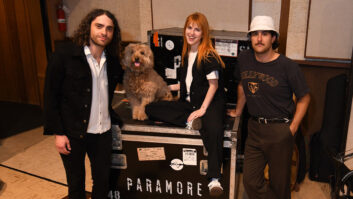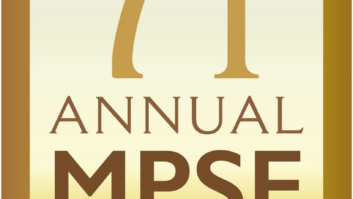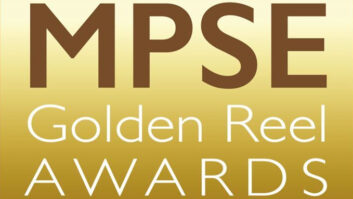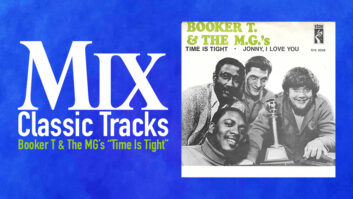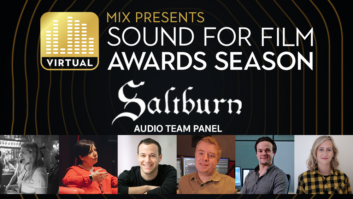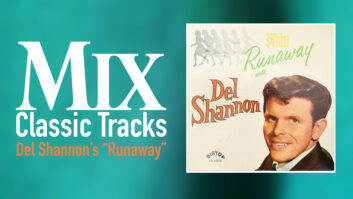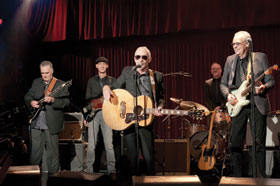
Graham Parker and The Rumour
Photo: Suzanne Hanover/Universal Pictures
In Judd Apatow’s latest comedy, This Is 40, British new wave survivor Graham Parker plays himself: a 60-something singer/songwriter who had a few hits a few decades ago, but who’s been living a relatively quiet life for years. Back in the ’70s and ’80s Parker had a backing band, The Rumour, and he was a young major-label artist with a soulful voice, songs full of biting sarcasm, and a career full of promise.
Parker still writes and records regularly near his home in upstate New York, and his talents have aged more than gracefully. He’s maybe more philosophical, but no less brilliant today than he was back in the ’70s, when more people mooned over how brilliant he was.
A longtime Graham Parker fan, Apatow first reached out to the artist a bit tentatively about some kind of participation in the movie—maybe a song, maybe an appearance. Then Parker let it drop that he had recently re-formed The Rumour, who were set to record together for the first time in 31 years, and Apatow decided to cast the artist as a high-quality has-been whose career Paul Rudd’s character—an aspiring label exec—hopes to resurrect. Far from being insulted, Parker told Rolling Stone, “I’m basically a metaphor for abject failure in Judd’s movie—and I couldn’t be more thrilled.”
Mix contacted Parker and his engineer, Dave Cook, last spring, while the reunion record, Three Chords Good, was in mastering engineer Toby Mountain’s hands. Here, Parker tells the story of how the album and his involvement with Apatow came about, and Cook describes the fun he had engineering and co-producing Three Chords Good.
Which came first: the movie or The Rumour?
I was just writing the songs for this album around the winter of 2010 into 2011, with absolutely no idea of a record with The Rumour. The last couple of my albums were made as I’ve done now and again over the years, where I go into a studio with a drummer and record, and then I play bass guitar, and have a keyboard player come in. They’ve been very self-contained albums. For these songs, although I didn’t think they were much different from the albums that preceded them, I thought I better do something a little fresh this time. So for some reason, unbidden, the idea of the Rumour rhythm section—Steve Goulding and Andrew Bodnar—popped into my head: Wouldn’t it be great to go in the studio with Steve and Andrew, and record with them as a three-piece? It would be a little bump of interest to people, but also I thought it would be fantastic music, because they’re excellent.

I emailed Stephen and Andrew, and both said, “Great, let’s do this,” and Steve made a little joke in his email, saying, “What if you got Martin [Belmont, guitar], Bob [Andrews, keys] and Brinsley [Schwarz, guitar]—that would be a proper band! Hahaha, kidding.” But like a kind of zombie, I went to the computer and emailed Martin and Bob, and they both came back and said, “Hmmmm, let me think about this for a minute—yes.” Suddenly I had four Rumour members, but then came the hardest part because Brinsley Schwarz is always rebuilding his house or something, and his electricity’s down, and his email doesn’t work. The guy hasn’t played with a band since 1989, when he was with me last. But he said, “Oh, okay.”
And I thought, “I’ve got the entire Rumour! Oh, shit! Oh no! What a can of worms I’ve opened. The recording costs. What am I going to do?” I’d thrown myself into this position without thinking it through, and that is always the best thing to do. Do not think. If I’d thought about it, I would have stopped the thing right there and then, because my philosophy on old bands re-forming is they do it for one reason: money. That means they’re stadium-sized bands, and the guys in the band didn’t make any money off the songs, or they’re running out of money after 30 years of hating each other, and they start to soften up as they get older; the drummer would like to make some money for his old age, so they do a tour. They make a record, which nobody wants to hear, and they tour, and they make a lot of money.
Graham Parker and The Rumour were a band that finished our career at the theater stage. This is not a money making proposition. And so I ended up doing it for all the wrong reasons, which are musical, musical and musical.
Where do all these guys live now?
Three of the guys live in England: Andrew, the bass player, lives in Yorkshire. He’s a librarian. Martin Belmont lives in London and plays in various little bands, and he’s also a music teacher. Brinsley Schwarz lives in Hampshire, and has been a luthier, working in a guitar store, since about 1989. Steve Goulding lives in New York, and Bob Andrews lives in New Orleans. The studio [Dreamland] is about 20 minutes from me, so I had to bring them all here.
When did the movie come into this?
It was May 2011. We had the studio [Dreamland, 20 minutes from his home] booked, and the band on the hook, when my publishing company, Primary Wave, got an email from Jonathan Karp, the music supervisor who works with Judd Apatow a lot, saying, “Judd would like to have a chat with Graham.”
We met up in New York, and he talked vaguely about this film, how two of the characters from Knocked Up, Pete and Debbie—Paul Rudd and Leslie Mann—are in it. It was alluded to in Knocked Up that Pete was working for a major record company and wasn’t all that happy with it. In this new movie, he’s started his own record company called Unfiltered Records. And what he wants to do is sign acts that he considers to be “real music”—’70s, ’80s, maybe ’90s acts—and one of them he’d love to get is Graham Parker.

Judd was filling me in on this, saying, “It would be great if we could have a song of yours or something”—kind of feeling me out. And I said, “Well, guess what? I just re-formed The Rumour, and we’re about to make an album. So not only does your fictitious record company man get me, he gets me and the reunion of The Rumour after a gap of about 31 years.” And he was like, “Whoa, okay, that’s interesting.”
We kind of left it at that, and a short time after, Judd emails me and says, “I got a lot of cool things we’re gonna do together.” And the next thing I know, it’s like, “We’re going to fly The Rumour to L.A. and we’re going to do a two-day shoot. You’re going to be in the movie acting as yourself. Let’s film you in a club. Pete the record company guy is showcasing you and The Rumour.” And then the other thing that Judd added to this mix was to give me a three-page email with ideas of songs to write.
Music for the film?
Yes, more music. It was during two weeks of rain in the summer here, and I just sat down and wrote a bunch of songs. The songs have got nothing to do with The Rumour album. I wrote nine songs based on Judd’s ideas, and about three weeks ago, they had me out in L.A., recording four of them, with a producer and composer, Jon Brion. This was a very weird thing for me, because I’m kind of a control freak, or I have been over recent years. I like to do the album cover, the concept of the album, everything about it. But this was like: I recorded the songs with Jon doing percussion, and then I left and said, “Okay guys, good luck.” It’s rather refreshing, but also rather scary. [Brion later fleshed out those tracks with music from avant-bluegrass group The Punch Brothers.]
How was it, going back into the studio with The Rumour?
It was basically like a Monty Python sketch. We just couldn’t stop laughing. That’s all we did. I don’t know how we got any work done. We just cracked up at the very idea of this thing happening, and it was all filmed. Judd insisted that we film this whole thing.
Suddenly I’ve gone from having a very simple, enjoyable life, playing little solo gigs and earning a living, to this. It’s weird. Ambition is something I lost a long time ago, and now this huge spanner has been thrown into the works, so it’s quite a prize really, I must say.
Barbara Schultz is a contributing editor to Mix and Electronic Musician, as well as a book editor and reviewer.

